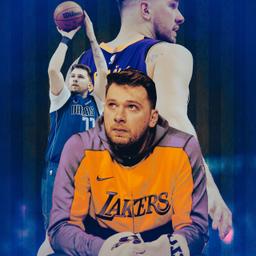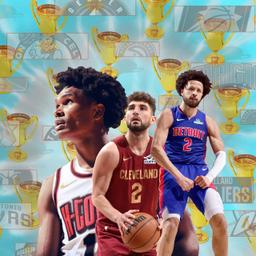A generational NBA superstar was celebrated Wednesday night, as generational NBA superstars often are—with roars and raucous applause and commemorative shirts. You could have called it a “lovefest” … if not for the tears and rage and anguish amid the ovations.
Has there ever been a more emotionally fraught NBA homecoming than Luka Doncic’s return to Dallas, where every ounce of adoration (for the player) was matched by seething anger (at the team executive who traded him)?
Then again, has there ever been a more emotionally fraught NBA regular season than the soon-to-conclude 2024-25 campaign?
The regular season ends Sunday and the playoffs are about a week away. We’ll soon be treated to the best the league has to offer—with newly emerging powerhouses (Oklahoma City and Cleveland), a feisty defending champion (Boston), and two aging legends (Stephen Curry and LeBron James) storming back into contention with their revived teams. We’ll have fresh young stars on fresh young teams (Detroit and Houston), and stubbornly competitive crews of vets (including Milwaukee and the L.A. Clippers).
The postseason could be our salvation. But the playoffs cannot get here soon enough to cleanse our collective palate of what has been, by so many measures, a particularly angsty and melancholy 82-game cycle.
It’s been a season of broken hearts and broken promises; of superteam implosions and superstar flameouts; of tankers tanking and would-be contenders, um, also tanking; of declining ratings and a dissolved TV partnership; of promising teams crushed by injuries and veteran squads sabotaged from within; of deep vein thrombosis and deep disappointment; of one shocking trade and two shocking late-season firings.
Of course, every season has its winners and losers, overachievers and underachievers, trades, firings, and injuries. It’s just that this season’s storylines feel, well, more extreme. The season has, in so many ways, for so many people, been a profound bummer. (And this isn’t just me, the jaded middle-aged reporter talking; I’ve been hearing some version of this from friends and league insiders for months.)
Start with the injuries, because good lord have there been a lot—perhaps even a record number. As of Thursday afternoon, the total player-games lost to injury stood at 6,489, per Jeff Stotts, a certified athletic trainer who tracks the data at InStreetClothes.com. That’s the second highest total in his database, which goes back to the 2005-06 season. But the highest, 7,497 player-games, came in 2021-22, when the Omicron variant of COVID-19 swept through the league; remove all games lost due to COVID, and the figure for that season drops to 6,150. Which makes 2024-25 the worst injury season in about two decades, perhaps ever.
And it’s not just the sheer number of games, but the names attached to them. Joel Embiid, the league MVP in 2023, played just 19 games this season, mostly because of knee problems. Doncic, who finished third in last year’s MVP race, has played in just 49 games. Anthony Davis, the star who was swapped for Doncic, is at 50. And the list of gimpy stars goes on (and on and on): Zion Williamson, 30 games played; Chet Holmgren, 32; Kawhi Leonard, 35; Paul George, 41; Paolo Banchero, 46; Victor Wembanyama, 46; Ja Morant, 49; Kyrie Irving, 50; Tyrese Maxey, 52; Jimmy Butler, 53; Damian Lillard, 58; Franz Wagner, 60.
On any given night, fans in one city or another are missing the chance to watch the greatest athletes on Earth perform. There’s no bigger bummer than that—except, of course, if you’re one of the athletes themselves. And the circumstances in some of these cases have been truly unsettling.
In February, the San Antonio Spurs announced that Wembanyama—one of the game’s brightest young stars—was suffering from deep vein thrombosis in his right shoulder and would miss the rest of the season. A month later, the Milwaukee Bucks announced that Lillard, a nine-time All-Star, was dealing with deep vein thrombosis in his right calf and would be out indefinitely.
Wembanyama’s absence throttled a once-promising season for the young Spurs, who seemed poised to make the play-in tournament after acquiring De’Aaron Fox from Sacramento. But the two played just five games together—and Fox’s season ended in mid-March, after he underwent finger surgery.
Williamson was supposed to lead a renaissance in New Orleans. But the Pelicans couldn’t keep him, or anyone else, on the court. They got just 20 games from ace defender Herb Jones, 53 from ace shooter Trey Murphy III, and 31 from Dejounte Murray, their marquee acquisition last summer. And they got just 18 games out of former All-Star Brandon Ingram, who was lost to an ankle injury and later traded to Toronto (where he played zero games).
The Orlando Magic were supposed to be the Next Big Thing in the East, but they’ll have to settle for a play-in spot after injuries to star forwards Banchero and Wagner and defensive maestro Jalen Suggs. Hell, the Magic even lost their backup Wagner—Moritz, Franz’s older brother. (Sadly, a third Wagner was not available.)
Philadelphia’s Jared McCain looked like one of the league’s best rookies … until a knee injury ended his season in mid-December. Atlanta’s Jalen Johnson was having a breakout year … until a season-ending shoulder injury in January. We couldn’t even get through the last week of the season without a horrifying scene: Memphis’s Jaylen Wells, a Rookie of the Year candidate, falling hard to the floor and breaking his wrist.
But the Grizzlies’ season had already gone off the rails, in part because of injuries to Morant, their star point guard. Two weeks ago, with just nine games left to play, the team fired coach Taylor Jenkins—a shocking decision for a playoff-bound team this late in the season. As if that wasn’t enough controversy, Morant got himself fined $75,000 by the league for repeated finger-guns celebrations.
The Jenkins firing was a stunner, a historic outlier, given the Grizzlies’ success and the proximity to the postseason. Then the playoff-bound Nuggets shocked the league all over again by firing coach Michael Malone and general manager Calvin Booth this week, with just three games left on the schedule.
At the time of his dismissal, Malone was the NBA’s fourth-longest tenured head coach, with 10 years leading the Nuggets. The leader of that list, Spurs legend Gregg Popovich, has missed most of the season after suffering a stroke in early November. Looking back, maybe it was an omen. The bad vibes just kept coming.
Also in early November, Embiid shoved and verbally berated a Philadelphia columnist in the Sixers’ locker room, which prompted a three-game suspension, casting an early pall over a Sixers season that never got any better.
The once-potent Miami Heat also short-circuited early when Jimmy Butler went to war with the front office over his contract, prompting team officials to announce they were open to trading him. By the time they did—in a February deal with the Golden State Warriors—the Heat’s season was already sunk. (They’re at the bottom end of the play-in bracket.)
By mid-December, the conversation had turned to eroding TV ratings, which spawned endless hand-wringing and countless theories: It’s because of all the 3-pointers! No, it’s all the player rest and load management! No, it’s the lack of new stars! Or a lack of American-born stars! No, it’s because of going woke! No, it’s because of the dumbed-down studio shows!
Speaking of TV, this is the last season of the NBA on TNT, a partnership that began in 1989. This fall, Amazon Prime and NBC will join ESPN as the NBA’s national broadcast partners. Which means this is also the last season of Inside the NBA—the most successful sports studio show of all time—on TNT. Chuck, Shaq, Ernie and Kenny will continue doing their thing, from the same TNT desk, but it will be less frequent and carried by ESPN.
In February, Inside the NBA covered its 14th and final All-Star weekend—which perhaps is for the best, given how dismal the event has become. The NBA’s latest attempt to revive the All-Star Game, with a new four-team tournament format, fell so flat that commissioner Adam Silver conceded, “It was a miss.”
That might be the least of Silver’s many concerns. Nothing irritates the commissioner more than tanking, or even the perception of tanking, and that topic once again consumed the final weeks of the regular season, as losing teams began jockeying for better odds to draft Duke phenom Cooper Flagg.
The Washington Wizards, Utah Jazz, and Brooklyn Nets all set out to tank at the beginning of this season—and they’ve done so brilliantly, if you’re into that sort of perversity. The Toronto Raptors did not set out to tank, but by March they were pioneering new ways to lose, benching starters during winnable games. The Charlotte Hornets didn’t set out to tank, but bottomed out due to injuries and ineptitude.
And then there’s the Sacramento Kings, who not only fired 2023 Coach of the Year Mike Brown (over the phone, no less), but traded Fox, their beloved franchise star, at his request.
So the Kings, who just two years ago became the NBA’s darlings and snapped a 17-year playoff drought, are now mired again in the All-Malaise Division. But not leading it. No, that dishonor is shared by the Mavericks, Suns, and 76ers.
The Sixers were supposed to be a contender with a new Big Three of Embiid, George, and Maxey. Instead, they spent the last several weeks shutting down players and giving away games to keep their top-six-protected draft pick.
The Suns were supposed to be a contender, with their (ahem) purported Big Three of Kevin Durant, Devin Booker, and Bradley Beal, and a record-breaking payroll. Instead, the Suns meandered through a thoroughly joyless season, flirted with trading Durant, and ultimately spiraled into irrelevance. They couldn’t even make the play-in tournament.
And then there’s the Mavericks. Oh, the Mavericks. You could argue that the Luka trade infused the Lakers with a new sense of excitement and potential—just as you could argue the Butler trade did for the Warriors. That’s the yin and yang of the NBA. And there’s no question the playoffs are far more appealing when LeBron (with Luka) and Steph (with Jimmy) are in the title hunt. But try telling that to Mavericks and Heat fans.
If the Luka trade is the most shocking, most logic-defying deal in NBA history (it is), then it is also the most devastating for the fans who had their hero ripped away. You could see it and hear it Wednesday night—the wild cheers every time Doncic dribbled, passed, and scored, alternating with the booming “Fire Nico” chants (aimed at Mavs GM Nico Harrison).
The pain of the trade was profound. The aftermath of the deal somehow made it worse. Davis went down with an injury in his Dallas debut. Irving went down with an ACL tear weeks later. The Mavs have made the play-in tournament, but this season is a bust. Given how long it takes to recover from an ACL, next season doesn’t look so great, either.
We’d love to offer some earnest encouragement to all these suffering fan bases, some nebulous silver lining to mitigate the suffering and angst. But, well, the best we can muster is this: At least it’s almost over.




